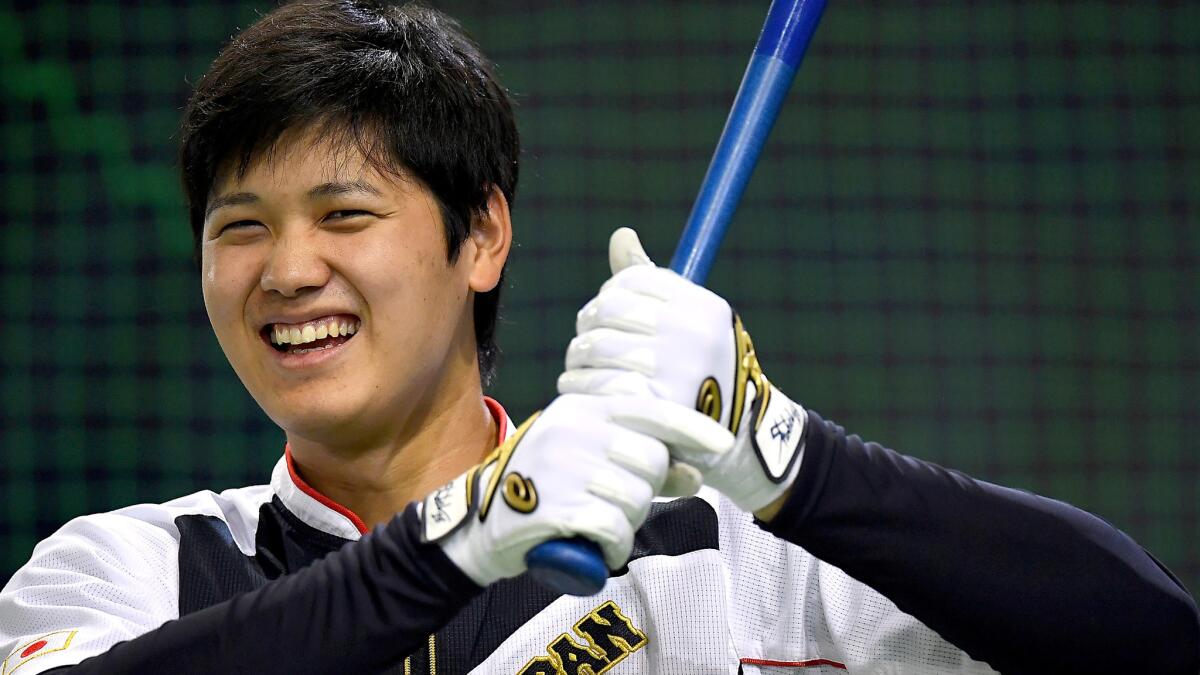For Shohei Ohtani, it’s about wanting to win a certain way

- Share via
You heard it when Japanese baseball star Shohei Ohtani informed the New York Yankees and Boston Red Sox he wouldn’t sign with them. You heard it again Friday when Ohtani decided to sign with the Angels instead of the Dodgers or Chicago Cubs.
Doesn’t Ohtani want to win?
Of course he does. He just wants to do it a certain way — his way, as a two-way player.
He is a unique player — no one else an throw a fastball 100 mph and also hit tape-measure home runs. He did that in Japan; he wants to show he can do that here. He signed with the Angels because he thinks they can help him realize that vision.
His representatives at CAA basically said as much Friday, when they released a statement that in part read, “In the end, he felt a strong connection with the Angels and believes they can best help him reach his goals in Major League Baseball.”
It wasn’t for money. The Angels are expected to pay Ohtani a $2.315-million signing bonus, most of which they acquired within the last week via trades. They will also send a $20-million posting fee to the Nippon-Ham Fighters, Ohtani’s former Japanese team.
For the first three years here, he is guaranteed to make no more than the major league minimum: about $545,000.
When Ohtani announced last month that he was leaving Japan, he spoke of the small group of people who believed he could be a two-way player when he was drafted by the Fighters, as well as the fans who supported his efforts.
“There’s a part of me that feels it’s not just mine,” Ohtani said in Japanese.
He shared his identity as a two-way player with the Fighters, and will now share with the Angels.The Angels are positioned to shoulder the responsibility. They can use a designated hitter, an advantage they held over four of the six other finalists Ohtani met with in Los Angeles this week.
This was no small matter. The physical burden of pitching and hitting is considerable. With the Fighters, Ohtani was often the DH three days a week, from Tuesday through Thursday. He used Friday and Saturday to prepare for his start on Sunday. Mondays are typically days off across Nippon Professional Baseball.
He could maintain a similar schedule with the Angels.
The Angels are expecting Albert Pujols to be healthy enough to resume playing first base, at least on a part-time basis. They could also move to a six-man pitching rotation, an idea general manager Billy Eppler has entertained for some time.
Ohtani said his goal was to become the top player in the world. He will now have an up-close look at what that takes, playing alongside Mike Trout, who currently holds that title in many people’s opinion.
Trout’s presence will also spare Ohtani from having to be the face of the franchise, or, for now, even the best player on his team.
Unlike the two other American League teams that were finalists for Ohtani’s services, the Angels provide an environment free of the ghosts of players considered legends in Japan.
With the Seattle Mariners, Ohtani would have been measured against Ichiro Suzuki. With the Texas Rangers, Yu Darvish would have been the standard.
Anaheim is relatively close to Los Angeles International Airport, which has direct flights to Japan. The Angels are in a big market but remain in the expansive shadow of the Dodgers.
Ohtani’s decision-making wasn’t driven by money — he might have cost himself upward of $200 million by not remaining in Japan for two more seasons — nor by status.
The big-market, big-money, star-studded Yankees and Dodgers were largely viewed as overwhelming favorites to land Ohtani a few months ago. His former high school coach and trusted advisor politely disagreed.
“He’s not the type of person who will say, ‘I want go there because they’re a strong team,’” Hiroshi Sasaki said. “If he was, he wouldn’t have chosen this high school.”
Sasaki coaches the team at Hanamaki Higashi High, which doesn’t recruit nationally like many of Japan’s prep baseball powerhouses.
There are people around baseball who have speculated that Ohtani couldn’t deal with the pressure of a large market. That’s unlikely. He was famous in Japan from the time he threw a 99-mph fastball in high school. His every move has been chronicled by large packs of reporters.
What Ohtani probably wants to stay clear of is a media environment that could force him to abandon his two-way experiment. Ohtani batted only .202 in his third year with the Fighters. If he was hitting like that for the Yankees or Red Sox, there would be widespread calls for him to concentrate on pitching. He could experience some of that in Anaheim, but it won’t be nearly as intense as it would be in other places.
It’s important to remember the last real two-way player in baseball was Babe Ruth, and that experiment lasted only a couple of seasons. Ohtani will almost certainly require multiple seasons to reach his potential.
The Angels convinced him not only that they would invest in his development, but that they would make efforts to grow along with him, as the Fighters did.
In Japan, he team finished last in his rookie year, third place in his second and second in his third.
When Ohtani became Japan’s top player in 2016, the Fighters became champions.
Follow Dylan Hernandez on Twitter @dylanohernandez
More to Read
Go beyond the scoreboard
Get the latest on L.A.'s teams in the daily Sports Report newsletter.
You may occasionally receive promotional content from the Los Angeles Times.











